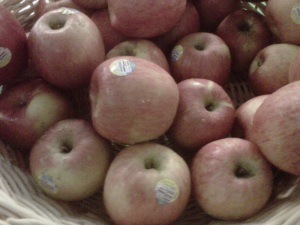To be Organic or Not to be Organic: THAT is the question!
 Many people often wonder if organically grown foods are “better” for you? People might make the assumption that eating organic fruits and vegetables are a healthier choice to non-organic fruits and vegetables. However, we must consider various factors before making the decision to “be organic or not to be organic”.
Many people often wonder if organically grown foods are “better” for you? People might make the assumption that eating organic fruits and vegetables are a healthier choice to non-organic fruits and vegetables. However, we must consider various factors before making the decision to “be organic or not to be organic”.
So what is organic? Organic refers to a non-conventional farming method that eliminates the use of fertilizer and weed and insect repellents (ie. Herbecides). This type of farming is meant to protect the environment by conserving water and soil and decreasing pollution. Foods that are grown organically must meet specific requirements to meet USDA standards.
Now, that we determined what organic is, let’s look at some things you might consider when choosing organic or non-organic foods.
Nutritional Content:
Most recent data has shown that consuming organic fruits are not more nutritious than those that are non-organic. However, there are some studies that beg to differ. This topic remains inconclusive. Nevertheless, incorporating more fruits and vegetables into your day is essential to improving your health; organic or not.
Cost:
Organic farming methods are typically more expensive than those of conventional methods yielding higher prices. Additionally, government regulations, more farming manpower and lower crop yields make organic a more expensive option.
Health Concern:
Many are concerned that the pesticides and herbicides sprayed during conventional farming pose a health risk. The pesticides and herbicides that are sprayed during conventional farming are meant to protect produce from weeds, rodents and insects. Whether the amount of pesticide a person is exposed to poses a health risk remains debatable. An organization of scientists, researchers and policy makers called the Environmental Working Group put together a list to give us more insight as to the amount of pesticides on various produce. They called this list “The Dirty Dozen” and “The Clean Fifteen”. These lists guide consumers as to which produce should be bought organic and which are not necessary. The twelve fruits and veggies included on “The Dirty Dozen” list have tested positive for at least 47 different chemicals and some, as many as 67. Those on “The Clean Fifteen” were tested to have no or little traces of chemicals and are safe to consume in their non-organic form. I have included the list below:
The Dirty Dozen and the Clean Fifteen
The Dirty Dozen
– Celery
– Peaches
– Strawberries
– Apples
– Domestic Blueberries
– Nectarines
– Sweet Bell Peppers
– Spinach
– Kale and Collard Greens
– Potatoes
– Imported Grapes
– Lettuce
The Clean Fifteen
– Onions
– Avocados
– Sweet Corn
– Pineapple
– Mango
– Sweet Peas
– Asparagus
– Kiwi fruits
– Cabbage
– Eggplant
– Cantaloupe
– Watermelon
– Grapefruit
– Sweet Potatoes
– Mushrooms
So, that still leaves the question organic or not? First, it is best to consider the factors above before making this decision. Second, it is wise to consider The Dirty Dozen and The Clean 15 before consuming non-organic fruits and veggies. Third, if cost is the issue, perhaps consider shopping at local farmers markets so you are at least contributing to your local economy. And, REMEMBER it is always best to choose to incorporate fruits and veggies into your daily intake than to not incorporate them at all.
Are you organic or not-organic? Looking forward to your comments.

Leave a Reply
Want to join the discussion?Feel free to contribute!